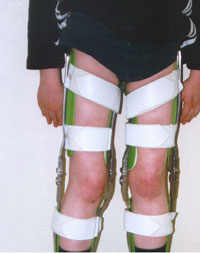Stem cells arouse hope in muscular dystrophy patients
By Margarita Snegireva. Researchers have created new possibilities for the treatment of Duchenne muscular dystrophy (DMD), having coaxed embryonic mouse stem cells to grow into healthy muscle tissue.

Duchenne muscular dystrophy ( DMD ) is a form of muscular dystrophy that is characterized by decreasing muscle mass and progressive loss of muscle function in male children. This disorder is caused by a mutation in a specific gene within the X chromosome that provides instructions for the formation of the dystrophin protein, an important component of muscle tissue. Females can be carriers but generally do not experience the symptoms of the condition.
Symptoms usually appear in male children before age 6 and may occur as early as infancy. Progressive muscle weakness of the legs and pelvis associated with a loss of muscle mass is observed and eventually spreads to the arms, neck, and other areas. Early signs may include enlarged calf muscles (pseudohypertrophy), low strength and endurance levels, and difficulties in standing up and walking on stairs. As the condition progresses, muscle tissue experiences wasting and fibrosis, and is eventually replaced by fat and connective tissue.
Duchenne muscular dystrophy occurs in approximately 2 out of 10,000 people and can either be inherited or occur spontaneously. A family history of Duchenne muscular dystrophy is a significant risk factor.
The University of Texas Southwestern Medical Center team focused on developing embryonic stem cells containing the gene Pax3, which triggers cells to grow into muscle tissue that will produce dystrophin.
"Embryonic stem cells can make every tissue in the body. We instructed these cells to make more skeletal muscle, and from a crowd of cells," explained study author Rita Perlingeiro. "We found a way to pull out only the ones destined to make muscle. These two steps combined resulted in a cell population capable of making muscle in a mouse with muscular dystrophy and, very importantly, the new muscle is stronger."
This is one of the few studies to test the ability of embryonic stem cells to grow in adult muscle tissue, the researchers added. The method they used also managed to avoid the risk of tumor formation in the mice.
Subscribe to Pravda.Ru Telegram channel, Facebook, RSS!


